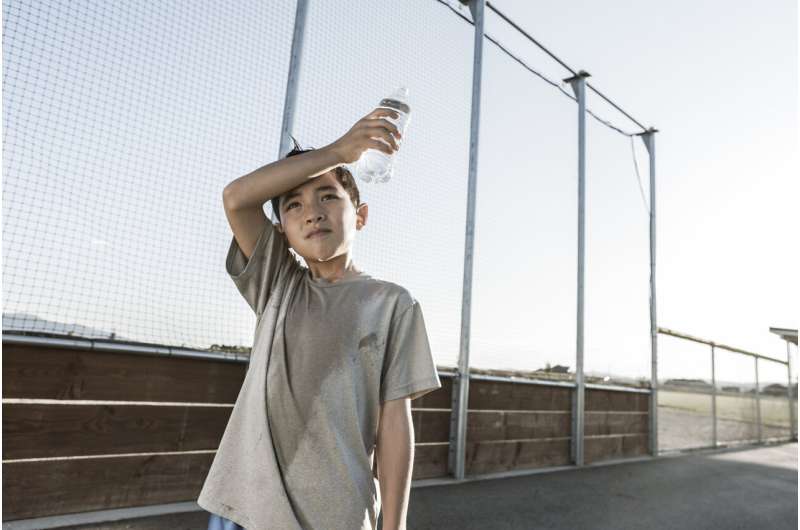This article has been reviewed according to Science X's editorial process and policies. Editors have highlighted the following attributes while ensuring the content's credibility:
fact-checked
trusted source
proofread
Extreme heat associated with children's asthma hospital visits

For children seeking care at a California urban pediatric health center, extreme heat events were associated with increased asthma hospital visits, according to research published at the ATS 2024 International Conference held May 17–22 in San Diego.
"We found that both daily high heat events and extreme temperatures that lasted several days increased the risk of asthma hospital visits," said corresponding author Morgan Ye, MPH, research data analyst, Division of Pulmonary and Critical Care Medicine, University of California, San Francisco School of Medicine.
"Understanding the impacts of climate-sensitive events such as extreme heat on a vulnerable population is the key to reducing the burden of disease due to climate change."
Ms. Ye and colleagues looked at 2017–2020 electronic health records from the UCSF Benioff Children's Hospital Oakland, which included data on asthma hospital visits by patients of the hospital, some of whom are from Benioff Oakland's Federally Qualified Health Center, and demographics including patients' zip codes.
They used data from the PRISM Climate Group of Oregon State University to determine the timing of daily maximum (daytime heat waves) and minimum (nighttime heat waves) for each zip code. The researchers restricted their analyses to the region's warm season (June to September).
To evaluate the potential range of effects of different heat wave measurements, they used 18 different heat wave definitions, including the 99th, 97.5th and 95th percentile of the total distribution of the study period for one, two or three days.
They designed the study in a way that allowed them to determine the association between each heat wave definition and a hospital visit. They repeated the analysis for Bay Area and Central California zip codes.
The team discovered that daytime heat waves were significantly associated with 19% higher odds of children's asthma hospital visits, and longer duration of heat waves doubled the odds of hospital visits. They did not observe any associations for nighttime heat waves.
According to Ye, "We continue to see global temperatures rise due to human-generated climate change, and we can expect a rise in health-related issues as we observe longer, more frequent and severe heat waves.
"Our research suggests that higher temperatures and increased duration of these high heat days are associated with increased risk of hospital visits due to asthma. Children and families with lower adaptation capacity will experience most of the burden.
"Therefore, it is important to obtain a better understanding of these heat-associated health risks and susceptible populations for future surveillance and targeted interventions."
The authors note that past research has suggested positive associations between extreme heat and asthma, but findings regarding hospitalizations and emergency room visits have been conflicting.
Additionally, many other studies have focused on respiratory hospitalizations and not hospitalizations for asthma, specifically, and have not included or had a focus on children.
This study is also unique because it investigated the effect of daily high temperatures but also the effects of persistent extreme temperatures.
The San Francisco Bay Area and California overall are unique areas of interest because the state is considered a coastal region with less prevalence of cooling units, such as air conditioners. While temperatures may not reach the extremes experienced in other parts of the country, this study demonstrates that even milder extreme heat temperatures may significantly impact health.
These effects are more pronounced in climate-susceptible populations, including children and those who are medically vulnerable, such as those served by the urban pediatric health center in this study. The authors hope these study results will lead to more equitable health outcomes and reduce racial/ethnic disparities observed in climate-sensitive events.
"These results can be used to inform targeted actions and resources for vulnerable children and alleviate health-related stress during heat waves," they conclude.
More information: Session: A95 – Climate Change and Health Disparities in Lung Disease, Extreme Heat and Asthma Hospitalizations in Children in California (2017–2020)


















